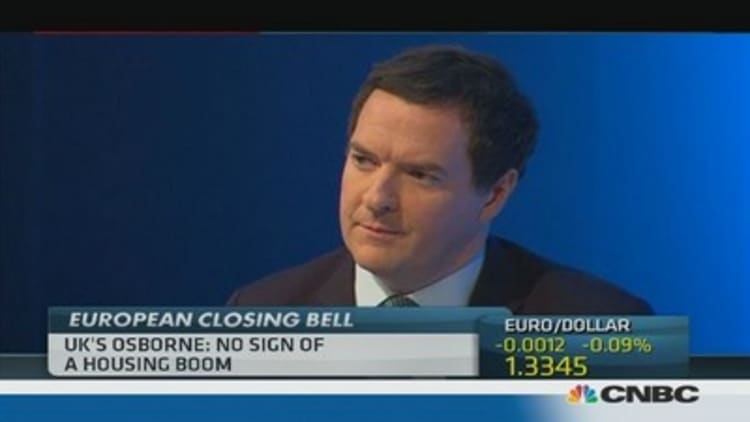U.K. Prime Minister David Cameron used his closing speech at his party's conference to reiterate the Conservatives' commitment to business, calling Britain "the land of opportunity".
"Bashing business may play to a Labour audience but it is crazy for our country," he said, in an attack on the left-wing opposition Labour party, which is currently leading the Conservatives in the polls.
"Our plan is to back business."
"Profit, wealth creation, tax cuts, enterprise — these are not dirty, elitist words. They are not the problem. They really are the solution, because it's not government that creates jobs, it's businesses," he said.
Cameron's speech is being seen as a direct response to last week's address by Labour leader, Ed Miliband, to his party's conference where he attacked big companies, especially the U.K.'s privately run utilities.
The strategy to cap energy prices, outlined by Miliband, has sparked criticism from the Conservatives, business representatives and certain parts of the media that Labour is about to return to hard line socialism - a development they warn could damage inward investment into the U.K.
(Read More: 'Blackout' warning for UK after energy freeze pledge)
The Conservative coalition government came to power nearly four years ago, beating the incumbent Labour government, taking over an economy battered by the global financial crisis and saddled with a large deficit.
"In 2010 the needle on the gauge was at crisis point," Cameron said on Wednesday, adding that the U.K.'s economy was finally "turning the corner".
However, Twitter comments reacted to Cameron's comments by pointing out that in 2010 Britain had a AAA rating. While since then, Moody's has downgraded the U.K. to AA .
Nonetheless the prime minister continued: "We are clearing up the mess that Labour left…But this is not job done, but the job just begun."
"We are still dealing with Labour's debt crisis. We need to earn more and our Government needs to spend less."
Cameron accused Labour of creating a "casino economy" with "too much spending, too much borrowing and too much debt."
"There is no short cut to a land of opportunity," he said. "We are in a global race today and no one owes us a living."
Cameron also reiterated his commitment to bringing corporation taxes lower.
(Read More: Labour Party vows energy bill freeze to woo voters)
"Global companies that employ lots of people can set up anywhere in the world. If the tax rates are too high they won't come here and they won't employ British people…The Labour stance is damaging and nonsensical. It is a twisted economic policy and we will fight it every step of the way."
Shadow business secretary Chuka Umunna responded by saying that "cutting business rates for 98 percent of business and promoting competition in energy is not bashing business it's promoting it."
In the aftermath of being voted down on military action in Syria the Prime Minister also used the speech to stress that Britain's role on the world stage was more important than ever.
"We may be a small island but I tell you what we are a great country."
Simon Collins, U.K. chairman of KPMG said that the "mood" with business leaders at the party conference had been very good. And that the political move left by Labour had created an opportunity for Tories.
(Read More: Cheers and fears for Osborne's belt-tightening)
"They're pleased that Miliband has gone anti-business as it enables a proper fight," said Collins.

Lord Kirkham, founder of furniture chain DFS - which is currently poised for a £ 1 billion ($1.6 billion) stock market float - said that Labour's strategy demonstrated a retrograde step for the economy and made the push for the next election even more vital.
"Labour want to take us back to socialism and the bad old days of the 1970s. That is very bad for business. We need less State involvement not more. I think if you just let business get on with it you would have so much more opportunity."
Lord Kirkham admitted that on measures like business rates – which affects the level of rent retailers are forced to pay – the Government "could always do more".
While the Conservatives are set to bring down income from corporation tax from £43.1 billion to £36.6 billion between 2012 and 2016, business rates are set to rise from £24.9 billion to £29.6 billion, according to OBR forecasts.
Retailers have hit out against the upward increase in rates against a backdrop of increased pressure on U.K. high streets. Over the next few years, business rates will overtake council tax and fuel duty to become the Exchequer's fifth biggest source of income behind income tax, national insurance, VAT and corporation tax.
Sales tax and immigration visas have also been a contentious issue for those in the tourism and hospitality industry.
Nick Varney, chief executive of Merlin Entertainments – also scheduled to float in the U.K., said that while the Tories been much more effective at engaging with business, there were huge issues that were holding industry back.
"There is more receptiveness and access than we ever had in the 13 years of Labour government. But on big issues like VAT and visas, which have been major problem for the industry, we have not seen them act."
John Longworth, the director general of the British Chambers of Commerce thought that Cameron had given a clear vision for the country but the harder task would be making it happen.
"The government cannot afford to become complacent, and must focus on creating an environment that supports enterprise and puts economic growth at its heart," he said.
Follow us on Twitter: @CNBCWorld

